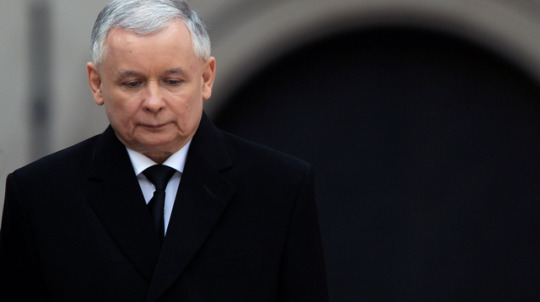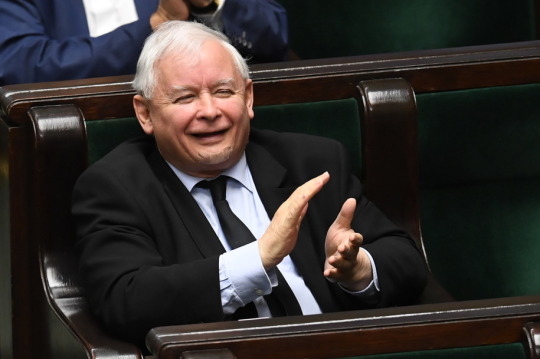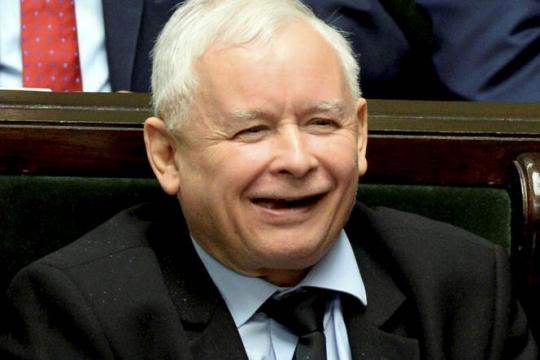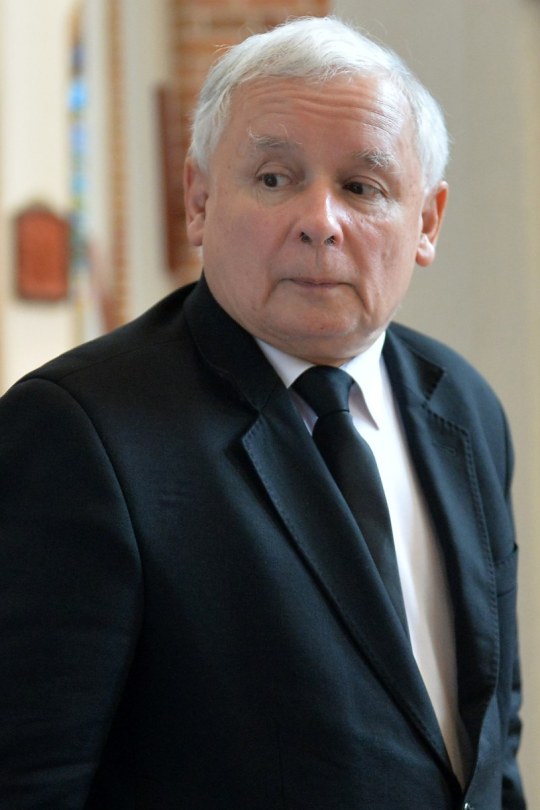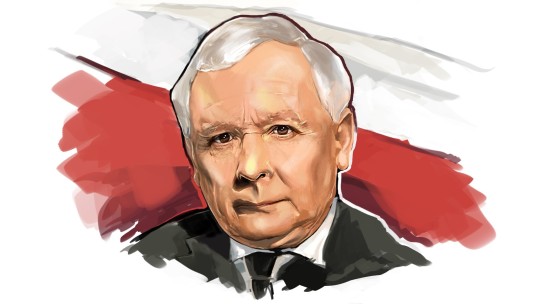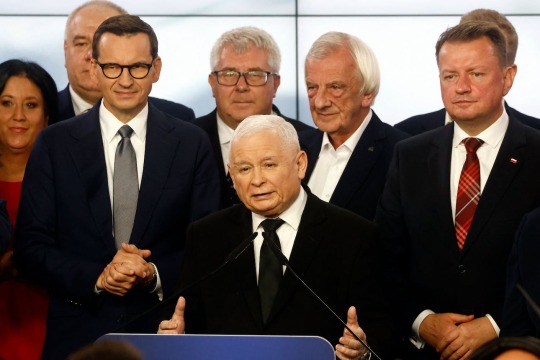#Jaroslaw Kaczynski
Text

Jarosław Kaczyński
#suitdaddy#suiteddaddy#suit and tie#men in suits#suited daddy#suited grandpa#suitedman#daddy#suit daddy#silverfox#suit chub#suitfetish#suited men#buisness suit#suited man#suitedmen#polish man#polish men#Jarosław Kaczyński#Jaroslaw Kaczynski
58 notes
·
View notes
Text
"Poland won, democracy has won," Mr Tusk, 66, told a large crowd of jubilant supporters in what felt like a victory rally in Warsaw. "This is the end of the bad times, this is the end of the PiS government."
CONGRATULATIONS POLAND!!!! 🇵🇱🇵🇱🇵🇱🎊🎊🎉🥳💖🙌🎉🎉💖🎊🥳🎉🎊🥳💖💖🎊🙌🎉🇵🇱🇵🇱🇵🇱
#gingerswagfreckles#poland#poland election#polish election#polish politics#donald tusk#Jaroslaw Kaczynski#this is a big fucking deal welcome back womens rights and democracy!!!!
73 notes
·
View notes
Text
“ La Guerra fredda aveva un senso. Fu una guerra ideologica in cui il vincitore, verosimilmente, avrebbe imposto al nemico sconfitto, per usare parole ormai screditate dal troppo uso, la propria filosofia e i propri valori. Può sembrare retorico, ma vi era in quello scontro fra giganti una certa nobiltà. Due grandi idee – la dittatura del proletariato e il capitalismo democratico – offrivano al mondo due strade diverse verso un futuro migliore. Le due diverse prospettive hanno creato speranze, attese, impegno e sacrifici che non sarebbe giusto ignorare.
Oggi ogni traccia di nobiltà è scomparsa. Il comunismo è fallito e, come accade sempre in queste circostanze, la memoria collettiva ricorda soltanto le sue pagine peggiori: i massacri della fase rivoluzionaria, la fame ucraina, la persecuzione del clero, le purghe, i gulag, il lavoro coatto, i popoli trasferiti con la forza da una regione all’altra. La democrazia capitalista non è in migliori condizioni. Il trasferimento del potere economico dai produttori di beni ai produttori di denaro ha enormemente allargato il divario fra gli immensamente ricchi e i drammaticamente poveri. Il denaro governa le campagne elettorali. Le grandi piaghe della prima metà del Novecento – nazionalismo, militarismo, razzismo – si sono nuovamente aperte. Il linguaggio della competizione politica è diventato becero e volgare. Le convention americane sono diventate un circo equestre in cui i candidati esibiscono i muscoli della loro retorica. Il meritato riposo e un busto nel Pantheon della nazione, che attendevano gli uomini di Stato alla fine della loro carriera politica, sono stati sostituiti da posti nei consigli d’amministrazione, laute consulenze e conferenze generosamente retribuite (come i 225.000 dollari pagati da Goldman Sachs a Hillary Clinton per un dibattito dopo i suoi quattro anni al Dipartimento di Stato). Anziché affidarsi a leader saggi e prudenti, molti popoli sembrano preferire i demagoghi, i tribuni della plebe, i caudillos.
Anche Putin appartiene per molti aspetti a un club frequentato da Erdoğan, Al Sisi, Orbán, Jaroslaw Kaczyński, Bibi Netanyahu, Xi Jinping, Lukašenko, per non parlare dei loro numerosi cugini in Africa e in Asia. Ma ha anche altre caratteristiche.
Deve governare un enorme spazio geografico popolato da una moltitudine di gruppi nazionali e religiosi. È il leader di un grande Paese che ha interessi legittimi e ambizioni comprensibili. È responsabile di una potenza che è anche un tassello indispensabile per l’amministrazione di un mondo caotico e pericoloso. Possiamo deplorare molti aspetti del suo carattere e della sua politica. Ma vedo sempre meno persone in Occidente che abbiano il diritto di impartirgli lezioni di democrazia. Occorrono 541 giorni per formare un governo in Belgio. Occorrono due elezioni politiche a distanza di sei mesi per formare un governo in Spagna. Occorrono tre commissioni bicamerali e due riforme costituzionali approvate dal Parlamento, ma sottoposte a referendum popolare, per cercare di modificare la costituzione in Italia. Nell’Unione Europea sono sempre più numerosi i cittadini che invocano il ritorno alle sovranità nazionali, ma in alcuni Stati nazionali (Belgio, Gran Bretagna, Spagna) la sovranità nazionale è contestata da regioni che chiedono il diritto di secessione. Mi chiedo: la democrazia è ancora un modello virtuoso che l’Europa delle democrazie malate e gli Stati Uniti delle sciagurate avventure mediorientali e del nuovo razzismo hanno il diritto di proporre alla Russia? “
Sergio Romano, Putin e la ricostruzione della grande Russia, Longanesi, 2016¹. [Libro elettronico]
#Vladimir Putin#Russia#leggere#citazioni#Putin e la ricostruzione della grande Russia#saggistica#saggi#Recep Tayyip Erdoğan#Viktor Orbán#Xi Jinping#Lukašenko#Aljaksandr Lukašėnka#Bibi Netanyahu#ideologia#democrazie#Abdel Fattah al-Sisi#Jaroslaw Kaczynski#Europa#Stati Uniti#dittatura del proletariato#Guerra fredda#demagogia#retorica#capitalismo democratico#Hillary Clinton#Ucraina#militarismo#nazionalismo#razzismo#Sergio Romano
25 notes
·
View notes
Text

Prezes Jarosław Kaczyński 💥
#jaroslaw kaczynski#kaczyński#prezes#art#polish artist#polska#ilustracja#illistration#retro art#poland#polish art#artists on tumblr#artists of tumblr#abstract art#artwork#my work
2 notes
·
View notes
Photo






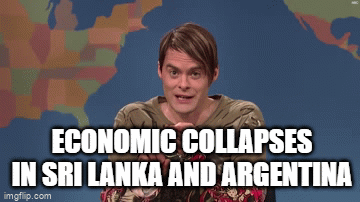



Personal bonus:
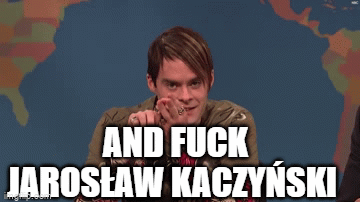
Tumblr News Update: Politics Edition (mostly)
#boris johnson#queen elizabeth ll#abe shinzo#hideo kojima#hugh grant#donald trump#canada#argentina#sri lanka#elon musk#putin#war in ukraine#poland#jaroslaw kaczynski
11 notes
·
View notes
Text
By Agnieszka Pikulicka-Wilczewska
June 14, 2023
WARSAW, June 14 (Reuters) - Abortion rights supporters marched through several cities in Poland on Wednesday after the death of a pregnant woman whose family believe she could have survived if she had been offered a termination.
Protesters chanted "stop killing us" as they marched through the capital Warsaw towards the health ministry headquarters, some carrying placards that said "We want doctors, not missionaries" and "Hell for women," a common slogan used to convey how the measure affects those who are carrying an unwanted or dangerous pregnancy.
Poland's anti-abortion laws, among the strictest in Europe, have provoked mass protests in recent years and the death of the 33-year-old named as Dorota in May has stoked anti-government sentiment among many liberal Poles ahead of elections due in October or November.
In 2021, the nationalist government of Prime Minister Mateusz Morawiecki put into effect a constitutional court decision banning terminations of pregnancies with foetal defects, as conservative policies increasingly take root in one of Europe's most devout Catholic countries.
Abortion rights activists have said that there were at least five cases of pregnant women dying whose families came out to the media, blaming the restrictions on abortion for their deaths.
Last month, Dorota died of septic shock in a hospital after her water broke in the 20th week of pregnancy. Her husband said nobody informed them of the option to induce a miscarriage, even though the child had very low chances of survival.
In 2021, a 30-year-old woman in the 22nd week of pregnancy, named Izabela, also died of septic shock after doctors waited for her unborn baby's heart to stop beating.
"We've had enough ... we protested when we found out about the death of Izabela almost two years ago and at the time we shouted 'not one more,'" Agnieszka Czerederecka, a founder of the Women's Strike movement in Warsaw, told Reuters. She added that there were protests in around 80 cities.
Jaroslaw Kaczynski, the ruling Law and Justice (PiS) party leader said that by law women could have abortions if there was any threat to their life or health.
"There is no such issue. It's been made up," he said in response to journalists' questions on Wednesday, accusing critics of the policy of "propaganda" and creating an "imaginary reality."
However, critics say that since the Constitutional Tribunal ruling, doctors have been more reluctant to perform terminations even in such cases.
A poll by IBRiS for private Radio Zet showed this week over 70% of Poles believe the strict abortion rules constitute a potential threat to women's life and health.
"I hope the law will change and I will not be afraid to get pregnant in Poland," said Joanna Jędrasiak, 36, an economist.
"I would like to have children very much, and to experience pregnancy, give birth to a healthy child, without the kind of problems that a few women have had and whom we commemorate here today."
Reporting by Karol Badohal, Agnieszka Pikulicka-Wilczewska and Anna Wlodarczak-Semczuk; Editing by Aurora Ellis
52 notes
·
View notes
Text
WARSAW, Poland (AP) — Polish opposition leader Donald Tusk declared the beginning of a new era for his country after opposition parties appeared to have won enough votes in Sunday’s election to oust the ruling populist party.
That party, Law and Justice, has bickered with allies and faced accusations of eroding rule of law at home in its eight years in power. It appeared that voters were mobilized like never before, voting in even greater numbers than when the nation ousted the communist authorities in 1989.
If the result predicted by an exit poll holds, Law and Justice won but also lost. It got more seats than any other party but not enough to build a government and pass laws in the legislature.
The Ipsos exit poll suggested that Law and Justice obtained 200 seats. The far-right Confederation got 12 seats, a showing the party said was a defeat.
It also showed that three opposition parties have likely won a combined 248 seats in the 460-seat lower house of parliament, the Sejm. The largest of the groups is Civic Coalition, led by Tusk, a former prime minister.
“I have been a politician for many years. I’m an athlete. Never in my life have I been so happy about taking seemingly second place. Poland won. Democracy has won. We have removed them from power,” Tusk told his cheering supporters.
“This result might still be better, but already today we can say this is the end of the bad time, this is end of Law and Justice rule,” Tusk added.
Law and Justice leader Jaroslaw Kaczynski acknowledged that the outcome was uncertain for his party. He told supporters at his headquarters that his party’s result, at nearly 37% of the vote, according to the exit poll, was a success, making it the party to win the most votes for three parliamentary elections in a row. But he also acknowledged it might not be able to keep power.
“We must have hope and we must also know that regardless of whether we are in power or in the opposition, we will implement this (political) project in various ways and we will not allow Poland to be betrayed,” Kaczynski said.
If the result holds, and Law and Justice is the single party with the most seats, then it would get the first chance to try to build a government.
It falls to President Andrzej Duda, who is an ally of Law and Justice, to tap a party to try to form a government.
Prime Minister Mateusz Morawiecki said on Polsat News that Duda “will entrust the mission of forming the government to the winning party and in this first step we will certainly try to build a parliamentary majority.”
Three opposition parties, Tusk’s Civic Coalition, Third Way and the New Left, ran on separate tickets but with the same promises of seeking to oust Law and Justice and restore good ties with the European Union.
Wlodzimierz Czarzasty, a leader of the Left party, vowed to work with the others to “create a democratic, strong, reasonable and predictable government.”
Katarzyna Pelczynska-Nalecz, the head of election campaign for Third Way, called it a “huge day for our democracy.”
“There is a lot of work to do for all of us, and it’s going to be a huge challenge,” she said, adding: “we are very satisfied and full of hope that things will be much better in Poland in the days, months and years to come.”
Votes were still being counted and the state electoral commission says it expects to have final results by Tuesday morning.
At stake are the health of the nation’s constitutional order, its legal stance on LGBTQ+ rights and abortion, and the foreign alliances of a country that has been a crucial ally to Ukraine after Russia launched its full-scale invasion.
Law and Justice has eroded checks and balances to gain more control over state institutions, including the courts, public media and the electoral process itself.
During the campaign many Poles described the vote as the most important one since 1989, when a new democracy was born after decades of communism.
Turnout Sunday appeared to be even higher than the 63% of those who voted in 1989 to oust the communists.
“It seems that we have broken a record,” said Sylwester Marciniak, the head of the state electoral commission.
Despite many uncertainties ahead, what appeared certain was that support for the ruling party has shrunk since the last election in 2019 when it won nearly 44% of the vote, its popularity dented by high inflation, allegations of cronyism and bickering with European allies.
If the result holds, it marks a sharp defeat for a ruling party that adopted divisive policies at home, often pushing laws through without trying to build consensus.
Others saw economic threats in the way the party has governed and believe that high social spending has helped to fuel inflation.
There is also a high level of state ownership in the Polish economy, and the governing party has built up a system of patronage, handing out thousands of jobs and contracts to its loyalists.
A political change could open the way for the EU to release billions of euros in funding that has been withheld over what the EU viewed as democratic erosion.
The fate of Poland’s relationship with Ukraine was also at stake. The Confederation party campaigned on an anti-Ukraine message, accusing the country of lacking gratitude to Poland for its help in Russia’s war. Its poor showing will be a relief for Kyiv.
Around 29 million Poles from age 18 were eligible to vote. They chose 460 members of the lower house, or Sejm, and 100 for the Senate for four-year terms.
A referendum on migration, the retirement age and other issues was held simultaneously. Some government opponents called on voters to boycott the referendum.
More than 31,000 voting stations operated across Poland, while there were more than 400 voting stations abroad. In a sign of the emotions generated by the vote, more than 600,000 Poles registered to vote abroad.
Individual parties need to get at least 5% of votes to win seats in parliament, while coalitions need at least 8% of votes.
20 notes
·
View notes
Text
Kalandozás a Magyar Nemzet egzotikus világában:
"Nincs demokrácia médiapluralizmus vagy erős kormányellenes média nélkül. Lengyelországban pedig ezek a közmédia." Jaroslaw Kaczynski
Rengeteg ember vonult az utcákra is tüntetni Donald Tuskék döntése ellen, amellyel gyakorlatilag felszámolta a lengyel közmédiát.
Újból bebizonyosodott, hogy az európéernek beállított politikusoktól messze nem áll távol a legsötétebb politikai tisztogatások és a jogon kívüli eszközök használatának kíméletlen módszertana – fogalmazott lapunk megkeresésére ifj. Lomnici Zoltán.
Az új kormánynak szüksége van a közmédia illegális átvételére, hogy elzárja a lengyeleket a kellemetlen igazságtól.
Költői kérdés magamtól: Milyen az a demokrácia, amelyben az adónkból működtetett közmédiából az ellenzék ki van zárva?? Most a demokráciát fogják lengyel barátaink visszaállítani végre
15 notes
·
View notes
Text

mike luckovich
* * * *
LETTERS FROM AN AMERICAN
January 18, 2024
HEATHER COX RICHARDSON
JAN 19, 2024
This afternoon, Congress passed a new continuing resolution necessary to fund the government past the upcoming deadlines in the previous continuing resolution. Those deadlines were tomorrow (January 19) and February 2. The deadlines in the new measure are March 1 and March 8. This is the third continuing resolution passed in four months as extremist Republicans have refused to fund the government unless they get a wish list of concessions to their ideology.
Today’s vote was no exception. Eighteen Republican senators voted against the measure, while five Republicans did not vote (at least one, Chuck Grassley of Iowa, is ill). All the Democrats voted in favor. The final tally was 77 to 18, with five not voting.
In the House the vote was 314 to 108, with 11 not voting. Republicans were evenly split between supporting government funding and voting against it, threatening to shut down the government. They split 107 to 106. All but two Democrats voted in favor of government funding. (In the past, Jake Auchincloss of Massachusetts and MIke Quigley of Illinois have voted no on a continuing resolution to fund the government in protest that the measure did not include funding for Ukraine.)
This means that, like his predecessor Kevin McCarthy (R-CA), House speaker Mike Johnson (R-LA) had to turn to Democrats to keep the government operating. The chair of the extremist House Freedom Caucus, Bob Good (R-VA), told reporters that before the House vote, Freedom Caucus members had tried to get Johnson to add to the measure the terms of their extremist border security bill. Such an addition would have tanked the bill, forcing a government shutdown, and Johnson refused.
“I always tell people back home beware of bipartisanship," Representative Warren Davidson (R-OH) said on the House floor during the debate. “The most bipartisan thing in Washington, D.C., is bankrupting our country, if not financially, morally…. It’s not just the spending, it’s all the terrible policies that are attached to the spending.”
Republican extremists in Congress are also doing the bidding of former president Donald Trump, blocking further aid to Ukraine in its struggle to fight off Russian aggression and standing in the way of a bipartisan immigration reform measure. Aid to Ukraine is widely popular both among the American people and among lawmakers. Immigration reform, which Republicans have demanded but are now opposing, would take away one of Trump’s only talking points before the 2024 election.
A piece today in the Washington Post by European affairs columnist Lee Hockstadter about the difficulties of reestablishing democracy in Poland after eight years under a right-wing leader illuminates this moment in the U.S. Hockstadter’s description of the party of former Polish leader Jaroslaw Kaczynski sounds familiar: the party “jury-rigged systems, rules and institutions to its own partisan advantage, seeding its allies in the courts, prosecutors’ offices, state-owned media and central bank. Kaczynski’s administration erected an intricate legal obstacle course designed to leave the party with a stranglehold on key levers of power even if it were ousted in elections.”
Although voters in Poland last fall reelected former prime minister Donald Tusk to reestablish democracy, his ability to rebuild the democratic and judicial norms torched by his predecessor have been hamstrung by his opponents, who make up an “irreconcilable opposition” and are trying to retain control over Poland through their seizure of key levers of government.
The U.S. was in a similar situation during Reconstruction, when in 1879, former Confederates in the Democratic Party tried to end the government protection of Black rights altogether by refusing to fund the government until the president, Republican Rutherford B. Hayes, withdrew all the U.S. troops from the South (it’s a myth that they left in 1877) and stopped trying to protect Black voting.
At the time, the president and House minority leader James A. Garfield refused to bow to the former Confederates. Five times, Hayes vetoed funding measures that carried the riders former Confederates wanted, writing that the Confederates’ policy was “radical, dangerous, and unconstitutional,” for it would allow a “bare majority” in the House to dictate its terms to the Senate and the President, thus destroying the balance of power in the American government.
In 1879, well aware of the stakes in the fight, newspapers made the case that the government was under assault. American voters listened, the former Confederates backed down, and Garfield somewhat unexpectedly was elected president in 1880 as a man who would champion the idea of the protection of Black rights and the country itself from those who wanted to establish that states were more powerful than the federal government.
Chastened, the leaders of the Democratic Party marginalized former Confederates and turned to northern cities to reestablish the party, beginning the transition to the party that would, fifty years later, usher in the New Deal.
LETTERS FROM AN AMERICAN
HEATHER COX RICHARDSON
#history#the New Deal#House Republicans#corrupt GOP#TFG#letters from an american#Heather Cox Richardson
9 notes
·
View notes
Text
Poland's conservative ruling Law and Justice party PiS released a political campaign video on Monday that suggests Germany is seeking to control the country's opposition.
In its campaign to win a third term in office, PiS has leaned heavily on anti-German sentiment, accusing its opponent, former Prime Minister Donald Tusk, of being a German puppet.
What happens in the advert?
The advert, posted on the social media network X, formerly known as Twitter, uses satellite imagery to hone in on the German embassy in Warsaw. It uses the sound of Richard Wagner's "Ride of The Valkyries" to build up a tense atmosphere as a member of the German embassy staff places a call.
It shows a cat's head turn as a phone rings out in the office of famously feline-loving PiS leader Jaroslaw Kaczynski.
"Guten Tag," says the caller, before continuing in heavily German-accented Polish. "I am calling from the German embassy and I would like to speak to the Chancellor about your 'Rentenalter', that is the retirement age in Poland. We believe it should be the same as it was under Prime Minister Tusk."
An unimpressed-looking Kaczynski responds: "Please apologize to the Chancellor, but it is the Polish people who will decide about this issue in a referendum," he says. "Tusk isn't here anymore, and those habits are finished."
Why was the ad released now?
Poland is holding elections on October 15 and there will be four referenda alongside the vote — including one on retirement age.
The ruling party has long criticized Tusk, who leads the opposition liberal Civic Coalition (KO), by hinting that he is acting at Germany's behest.
Tusk, who served as prime minister from 2007 to 2014, raised the retirement age to 67 from a previous 65 for men and 60 for women.
When PiS came to power, it reversed the move. Former President of the European Council Tusk says he does not plan to raise it again.
A spokesperson for the German foreign office told the Associated Press that it did not comment on Poland's domestic political debates, including the commercial.
Poland is also set to hold referenda on privatization, hardening the border with Belarus and rejecting migrants under an EU deal.
The opposition says the plebiscites are an exercise to mobilize government supporters and demonize opponents with a string of loaded questions.
12 notes
·
View notes
Text

2023 / 41
Aperçu of the Week:
"They say in the Middle East: a pessimist is simply an optimist with experience."
(Ehud Barak, former General and Prime Minister of the State of Israel)
Bad News of the Week:
It was always such a thing when a new country was "discovered." Because that always applied only to the usually white seafarer from Europe, because - surprise! - there were, after all, in 99% of the cases already inhabitants on the spot. And in many of these places, unfortunately, the First Nations are still second-class citizens. For example in Australia. But that was about to change. At least that was the plan of Prime Minister Anthony Albanese.
Unfortunately, he was not the only one to be bitterly disappointed. His idea was to give Australia's indigenous people more political influence with a constitutional amendment. They were to be heard only on matters that directly affect them ("voice to parliament"). Only heard - because everything would still be decided in the almost purely white parliament. So, if you want to see it that way, rather a symbolic gesture of respect. And yet a clear majority voted against the project in the corresponding referendum.
"For Prime Minister Albanese it is a heavy defeat," write the newspapers. What then is it for the Aborigines? Indigenous Australians are considered the oldest surviving culture in the world and have populated the continent for more than 60,000 years. They were there first. And yet only come last. Sad.
Good News of the Week:
Germany has a long checkered history with Poland. With dark and light chapters. One would like to speak of a community of fate. First the fall of the Iron Curtain, then accession to the European Union, all will be well. But then strange developments began in our neighbor to the east. Which can be associated with one name: Kaczynski.
The two brothers Lech and Jaroslaw with their PiS party (Prawo i Sprawiedliwosc / Law and Justice) have had a decisive influence on Poland's last 20 years. With their programmatic emphasis on nationalism, EU skepticism, social conservatism, right-wing populism, etc., they were a reliable partner of Hungary's omnipotent Viktor Orban and a declared opponent of Brussels and Berlin. This is also how they campaigned: they did not want to be told anything more from the European Union and especially (by name!) from Germany. A ridiculous distortion of reality. Or a bad joke.
Facing them in the election this Sunday were several opposition parties. And increasingly critical voters, who in some places took to the streets in their hundreds of thousands to take a stand for the independence of the judiciary, for example. Their figurehead, Donald Tusk, can in many ways be seen as the antipode of the Kaczynskis. Among other things, he is an avowed pro-European. Of course, after all, he served for five years as president of the European Council and another three as chairman of the European People's Party.
Tusk is now the real winner. Even if he only came in second place with his Platforma Obywatelska (Civic Platform) party. This is because, unlike the PiS, which is still the strongest party but suffered significant losses, he has the realistic prospect of being able to form a solid parliamentary majority with programmatically compatible coalition partners. "This is an epochal event, comparable to Joe Biden's victory over Donald Trump," writes the news magazine Der Spiegel. Good prospects for Poland. For its neighbor Germany. And for all of Europe.
Personal happy moment of the week:
My son is going to do more sports. And I don't mean esports. But basketball. In the coming week he will do his first workouts. With physical movement. And sweat. I also like the fact that he has already ridden his bike to school 90% of the time this school year, rather than taking the bus. Even if, I suspect, the main reason is that he doesn't have to get up until fifteen minutes later. Anyway, physical exercise is important for a 15-year-old. So I try to pay attention to that. Let's go!
PS: Now he has already been to basketball training for two hours for the first time. And seems to like it. And I like it too.
I couldn't care less...
...that families can now get a low-interest loan from the government to buy a house. For most of us (and especially in the Munich area) it is utopian to be able to afford home ownership either way.
As I write this...
...I am waiting for the new album of The Rolling Stones. For 18 years the probably longest active rock'n'rollers of all times haven't released any new songs. But next Friday the time has come: "Hackney Diamonds" will be released. I'm curious.
Post Scriptum
In the times of the Gaza war, you have to weigh your words carefully. Unlike the Ukraine war, there is no clear assignment of perpetrator and victim roles of two states here. Rather, the line must be drawn here between rulers who act irresponsibly and peoples who endure the consequences of their actions. Have to endure, there is no choice.
On the one hand, there are the terrorists of Hamas (not the Palestinians!), who, ideologically blinded, are causing inconceivable carnage among innocent civilians. On the other hand, there is an increasingly right-wing radical regime in the Knesset that denies the Palestinian people their right to exist and their territorial integrity (keyword: settlement policy in the West Bank). In between are two peoples who are experiencing unbelievable suffering.
Rarely do the EU and China agree, but their joint appeal for a two-state solution will once again go unheard. In this conflict, I cannot take sides with either side. I simply wish that the killing would stop. And that the rulers on both sides can agree on a sustainable peace in the interest of their peoples. But my hope will probably prove to be quite naive once again...
#thoughts#aperçu#good news#bad news#news of the week#happy moments#politics#middle east#ehud barak#australia#first nations#anthony albanese#aborigines#poland#germany#Kaczynski#donald tusk#basketball#esports#the rolling stones#gaza#israel#palestinians#two state solution#hackney diamonds#europe#physical exercise#european#viktor orban#discovery
3 notes
·
View notes
Text

Kaczyland
#kaczka#jaroslaw kaczynski#kaczystan#polish artist#rysunek#węgiel#pasteles#art#plastyka#polski artysta#artystka#piekne#kaczuszka#szkice#bazgroły
1 note
·
View note
Text
Poland asks Germany for billions in WWII compensation
Poland asks Germany for billions in WWII compensation
The leader of Poland’s nationalist conservative Law and Justice (PiS, in power), Jaroslaw Kaczynski, said on Thursday that Poland will ask Germany for 1.3 billion euros in compensation for the Nazi occupation in World War II.
Kaczynski announced the claim with the release of a much-anticipated report on the cost to the country of the years of Nazi German occupation, as we look back at 83 years…

View On WordPress
2 notes
·
View notes



